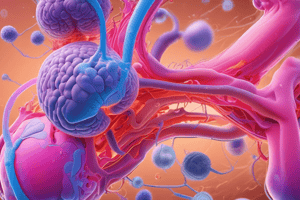Podcast
Questions and Answers
What is the primary function of the proximal convoluted tubule?
What is the primary function of the proximal convoluted tubule?
- Secretion of drugs
- Adjusting the urine volume
- Filtration
- Absorption of ions, organic molecules, vitamins, and water (correct)
- Secretion of acids and ammonia
Where does the process of filtration occur?
Where does the process of filtration occur?
- Collecting duct
- Distal convoluted tubule
- Nephron loop (loop of Henle)
- Proximal convoluted tubule
- Glomerular (Bowman's) capsule (correct)
What does the filtration barrier in the renal corpuscle consist of?
What does the filtration barrier in the renal corpuscle consist of?
- Fenestrations, matrix, and foot processes
- Filtration slits, foot processes, and slit pores
- Dense layer of glomerulus, foot processes, and fenestrations in the capsule
- Podocyte filtration slits, matrix cells in the glomerulus, and endothelium of glomerulus
- Endothelium of glomerulus, dense layer of glomerulus, and podocyte filtration slits (correct)
The glomeruli are best described as being tufts of what?
The glomeruli are best described as being tufts of what?
The majority of glomeruli are located in the ________ of the kidney.
The majority of glomeruli are located in the ________ of the kidney.
The renal threshold for glucose is approximately ________ mg/dl.
The renal threshold for glucose is approximately ________ mg/dl.
Substances larger than ________ are normally not allowed to pass through the filtration membrane.
Substances larger than ________ are normally not allowed to pass through the filtration membrane.
What drives the process of filtration?
What drives the process of filtration?
Approximately ________ liters of glomerular filtrate enter glomerular capsules each day.
Approximately ________ liters of glomerular filtrate enter glomerular capsules each day.
Calculate the net filtration pressure given a glomerular capillary pressure of 69 mm Hg, a pressure in the capsular space of 15 mm Hg, and a colloid osmotic pressure of 30 mm Hg.
Calculate the net filtration pressure given a glomerular capillary pressure of 69 mm Hg, a pressure in the capsular space of 15 mm Hg, and a colloid osmotic pressure of 30 mm Hg.
If heavy exercise reduces blood flow to the kidneys, which of the following might occur?
If heavy exercise reduces blood flow to the kidneys, which of the following might occur?
What generates blood colloid osmotic pressure (BCOP) in the glomerulus?
What generates blood colloid osmotic pressure (BCOP) in the glomerulus?
What is the main force that causes filtration in a nephron?
What is the main force that causes filtration in a nephron?
Flashcards are hidden until you start studying
Study Notes
Proximal Convoluted Tubule Functions
- The primary role is the absorption of ions, organic molecules, vitamins, and water.
Filtration Process
- Filtration mainly occurs at the glomerular (Bowman's) capsule.
Filtration Barrier Structure
- Composed of the endothelium of glomerulus, dense layer of glomerulus, and podocyte filtration slits.
Glomeruli Characteristics
- Described as tufts of capillaries crucial for blood filtration.
Glomeruli Location
- The majority of glomeruli are located in the cortex of the kidney.
Renal Threshold for Glucose
- Set at approximately 180 mg/dl, regulating glucose reabsorption.
Filtration Membrane Selectivity
- Substances larger than albumin (about 66 kDa) are typically restricted from passing through.
Filtration Driving Force
- Driven primarily by blood hydrostatic pressure within the renal corpuscle.
Glomerular Filtrate Volume
- Approximately 180 liters of glomerular filtrate enter glomerular capsules daily.
Net Filtration Pressure Calculation
- When glomerular capillary pressure is 69 mm Hg, capsular space pressure is 15 mm Hg, and colloid osmotic pressure is 30 mm Hg, the net filtration pressure is 24 mmHg.
Kidney Response to Blood Flow Reduction
- Heavy exercise may result in protein or blood presence in urine, permanent kidney injury, or damage to the glomeruli.
Blood Colloid Osmotic Pressure (BCOP)
- Generated by the presence of large, non-diffusible proteins in blood plasma, which draws water back into circulation.
Main Filtration Force
- Glomerular hydrostatic pressure is the primary force causing filtration in the nephron.
Studying That Suits You
Use AI to generate personalized quizzes and flashcards to suit your learning preferences.




